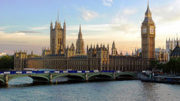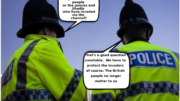Previously blogged at: https://peakd.com/britain/@mrfahrenheit211/from-elsewhere-dear-americans-without-your-first-amendment-you-could-be-like-us-britons
Before I start this ‘From Elsewhere’ piece I thought I’d let new readers of my work understand why the ‘From Elsewhere’ and the similar companion pieces ‘Quote of the Day’ exist.
Whenever and wherever I have previously blogged, I have come across stuff written by others that I wish to promote, so that others can see what these authors are saying. It’s my hope that people will understand why I’m promoting these other authors and read them and get the same enjoyment or interest out of them as I have.
These ‘From Elsewhere’ and ‘Quote of the Day’ pieces also allow me to comment on these pieces and say what I like about them, what I dislike about them and why I feel the way that I do about the writings. I try to quote no more than a couple of paragraphs of the author’s text, in order to tempt people to go elsewhere to read the entire piece. Normally if I’ve quoted someone in these strands then it’s because I believe that they have said something that might be valuable to others. If you see one of my ‘From Elsewhere’ or ‘Quote of the Day’ pieces and you like them, then please go to the original source and give the authors some appreciation.
My dear Americans. You live in a culture and a legal system that has aspects to it that can be utterly incomprehensible for some Britons. I speak specifically of your First Amendment to your Constitution. We don’t have that Constitutional Right and the only thing remotely similar to that is the provisions in the 1689 Bill of Rights which allow complete free speech for Parliamentarians. The idea that the ordinary British Subject (yes we are technically subjects not citizens owing to the nature of our Constitution) should be able to say what we want, when we want and not be imprisoned for it or lose our jobs over it, is alien to the average Briton.
I doubt that the average American can imagine what it is like to, for example, make a post on X or on some blog or on a newspaper comment page (if you can find one still open) or wherever and have to wonder whether this will be the comment that will bring the police to your door? Imagine if you will that you make a post somewhere about politics or society or religion that someone finds ‘offensive’ and know that someone whining about being offended will most likely cause you an awful lot of trouble. That’s what life is like in Britain and that’s what life is like without the First Amendment protections that my American friends have.
Freedom of speech of the sort enjoyed by American citizens is not a ‘problem’, which is the view of many in the British Establishment, on the contrary it’s a vital part of creating and keeping an open society running. If you can’t debate ideas, then it is harder to create what society may need or want. You can’t create potentially successful businesses unless you are free to do that and you can’t create a society where good ideas are promoted and bad ideas rejected unless the citizen or subject of a nation is permitted to do that.
Like a frog slowly boiling to death without realising it, Britons have been increasingly restricted with regards to speech. Some of those restrictions such as the 1861 Offences Against The Persons Actwhich forbade people from threatening to kill others, are in my view eminently sensible. A threat to kill goes beyond what any reasonable person would consider as free speech.
However many of the other restrictions on freedom of speech that have been imposed on Britons over the last quarter century or so are less sensible. They restrict greatly what Britons can say and give enormous political and legal power to those who may claim to have been offended by certain words or opinions. The mere subjective claim of ‘offence’ can set the wheels of the police and courts system in motion and what’s worse is there is little that can be done under current legislation to either investigate what may be a false or malicious claim or debunk it prior to the claim ending up as a court case.
Tom Slater, the editor of the British politics and society magazine Spiked, has written a brilliant piece about the death of freedom of speech in the UK. He remarked how worryingly mundane it has become for British subjects to get police visits because of what the individual Briton has said. This is a fantastically strong long form piece from Mr Slater and I’d advise anyone interested in the subject of freedom of expression to read it.
Mr Slater said:
*Britain hasn’t been suddenly turned into a dictatorship by newly elected prime minister Keir Starmer, as some of the more wildeyed voices on X might have you believe. But we have been engaged in a decades-long, deeply illiberal experiment in policing ‘hate speech’ – which is now making us an international laughing stock.
The offence of inciting racial hatred, of which Pearson was accused, was first created in Britain in 1965, with the passage of the Race Relations Act. This notion that it was the role of the state to define and police hatred – that, in essence, censorship was our path to racial harmony – was enshrined in law and elite culture.
This sits in stark contrast to the United States. It was in the 1960s – amid the civil-rights revolution, the bottom-up demand from black Americans for their rights – that the expansive free-speech protections Americans now enjoy were won. Until then, the First Amendment had essentially been a dead letter – gifted by the Founders but never enforced in practice.
The project of speech policing and thought control was embraced enthusiastically by Tony Blair’s government. In 2006, the then New Labour government passed the Racial and Religious Hatred Act, introducing the offence of ‘incitement to religious hatred’. Were it not for a successful campaign to rein in that legislation, led by comedian Rowan Atkinson, it would have criminalised ‘abusive or insulting’ language about religion, too.
But arguably Blair’s more consequential contribution to ‘hate speech’ legislation came with the Communications Act of 2003. Under Section 127 of this law, it is illegal to send ‘by means of a public electronic-communications network a message or other matter that is grossly offensive’. While this was an update on a pre-existing telecoms offence, it made it match fit for the digital age.*
I found Mr Slater’s comment about the role that the First Amendment played in the Civil Rights Movement of the 1960’s interesting. It made me wonder if what had been achieved back then could have been achieved without there being a constitutionally guaranteed right to speak freely? Being British I can see a whole host of scenarios where campaigners for Civil Rights, who would have been seen by many in the Establishment of the time as upsetting the status quo could thereby have their speech restricted, either by the law or by a cancel culture. Britain or rather those who govern us, have become very adept at using the power of the state to silence or sideline or propagandise against those who ask the sort of awkward questions that some in authority might dislike being asked.
Mr Slater’s comments on the 1965 Race Relations Act also deserve comment. I strongly suspect that this bit of legislation came from a good place, the desire that all Britons should be treated equally. I also suspect that this legislation may have been, at least in part, a response by Parliament to events in America connected and related to the Civil Rights Movement and was Britain’s way of heading off similar upheavals in the UK. In any event the equal treatment of Britons no matter what their skin colour is what should be expected from a nation that spent decades and a significant amount of blood and treasure, to stamp out the slave trade. However I do agree with Mr Slater’s assertion that parts of this Act have had unintended consequences, some of which are having very nasty contemporary effects on Britain and Britons.
The 1965 Race Relations Act did create an opportunity for the State to become more involved with controlling the public’s speech than it would normally have had during Peacetime. It did, as Mr Slater said, create a policy where censorship of the expression of people’s feelings such as ‘hate’, was the go to lever that the state needed to pull on in certain circumstances. Thinking about it, it should have been possible to have created a level playing field for Britons without giving the State a right to grossly and unnecessarily interfere in the public’s right to speak freely.
Restrictive speech laws and the partisan and often biased way that they are used by the State affect and afflict everyone. They negatively affect those who wish to call attention to the scourge of the ‘Grooming Gangs’ that operate in many British cities and towns, it affects the ex-Muslim who wishes to leave Islam and speak about their experiences of that faith. It affects the ability of some parents to object to particular lessons in British schools or certain teaching materials. Even banter between friends in a public place can become the subject of criminal investigation and potential prosecution should someone overhear what is being said and be ‘offended’. Conversations on subjects that maybe should be discussed in a free and open environment for the benefit of the nation as a whole are less easy to access and contribute to in Britain when compared to the United States.
Restrictive speech laws such as those that we have in the United Kingdom often hurt individuals and society much more deeply than the words and opinions that these laws clamp down on. These laws make the British subject afraid to speak, afraid to voice whatever is their concern and afraid to criticise that which might really need to be criticised.
Free speech needs to be returned to Britons. Yes that which might be said if free speech returned to Britain might be disturbing or wrong or offensive, but I’d rather there be a situation where arseholes can speak their braincell because their right to speak would also be my right to speak and challenge that arsehole.
I would most strongly advise that anyone who is interested in the subject of freedom of expression or the dire state of it in the United Kingdom, read Mr Slater’s full piece which I have linked below as well as in the body text above.





